Key takeaways:
- Pro-life advocacy involves recognizing the dignity of life from conception to natural death, emphasizing personal stories and emotional connections.
- Education is crucial in advocacy, as it equips individuals to articulate their views confidently and fosters empathy through understanding diverse experiences.
- Recognizing one’s educational privileges encourages the responsibility to support under-resourced individuals in advocacy contexts.
- Effective pro-life advocacy is rooted in empathy and personal stories, highlighting the need for inclusion and collaboration to amplify marginalized voices.
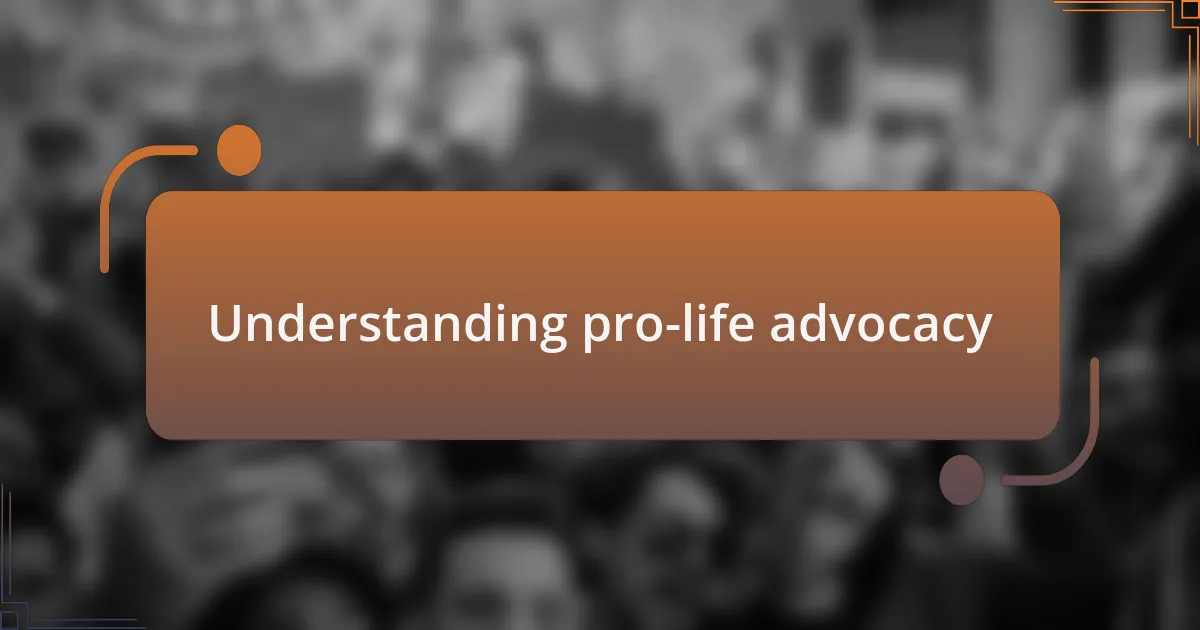
Understanding pro-life advocacy
Pro-life advocacy encompasses more than just a stance against abortion; it is a holistic approach that recognizes the dignity of all human life from conception to natural death. When I first encountered this movement, I was struck by the deep passion and conviction of its supporters. I often found myself thinking, what drives someone to take such a strong stand for the unborn?
In my experience, engaging in conversations about pro-life values often reveals a tapestry of personal stories. I remember speaking with a friend who shared her own story of unplanned pregnancy and how she navigated the challenging emotional landscape that came with it. Her journey opened my eyes to the struggles and resilience of individuals involved in these discussions, reminding me that behind each statistic lies a deeply personal narrative.
The emotional weight of pro-life advocacy can sometimes feel overwhelming, but it also illuminates the profound connections between individuals and their choices. I often ask myself how we can create more supportive environments for expectant parents. Hearing stories of love, community support, and second chances highlights the essential role we all play in fostering a culture that values life at every stage.
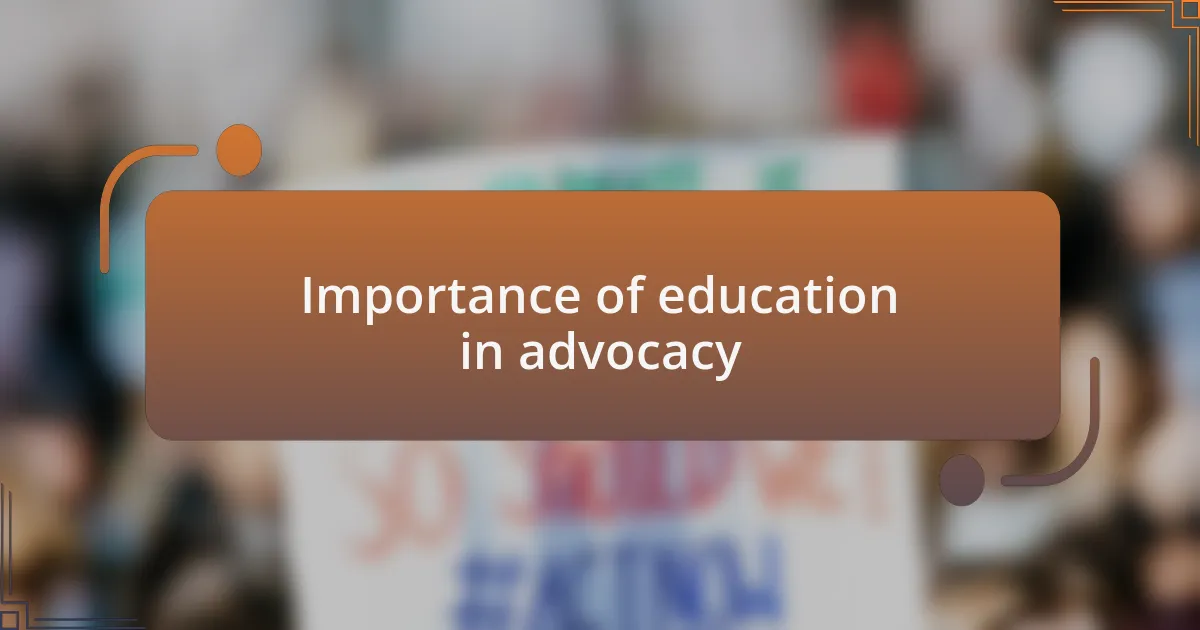
Importance of education in advocacy
I’ve come to realize that education serves as the backbone of effective advocacy. The knowledge I gained through formal education and self-study has equipped me to better articulate the pro-life message. For instance, I recall a workshop where I learned about the scientific aspects of fetal development. That understanding transformed my conversations, allowing me to discuss the topic with more confidence and clarity.
Moreover, education fosters critical thinking, which is essential in advocacy. I remember attending a debate where opposing views were passionately discussed. The research I had conducted beforehand helped me counter arguments effectively, demonstrating that being well-informed not only strengthens our position but also fosters respectful dialogue. How can we expect to persuade others if we lack a solid grasp of the facts or the ethical principles involved?
In my experience, education also inspires empathy. Learning about the personal journeys of others, whether through case studies or firsthand accounts, opened my heart to the complexities of pro-life advocacy. This insight deepened my commitment to not only share facts but to also listen and understand the stories behind the statistics. Isn’t it vital to encourage compassion alongside knowledge in our advocacy efforts?
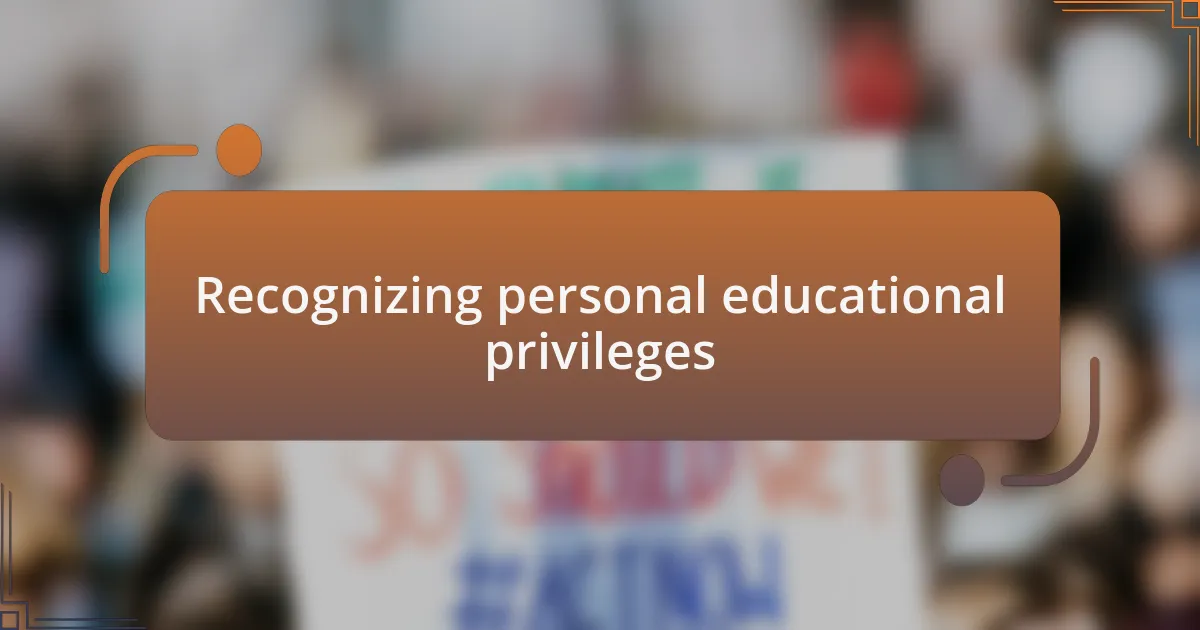
Recognizing personal educational privileges
Recognizing personal educational privileges requires a moment of reflection on the circumstances that have shaped my learning journey. I can vividly recall moments in high school when my teachers went above and beyond, offering additional resources and support that many students might not have received. This experience made me aware that not everyone has access to such dedicated educators, and it instilled in me a sense of responsibility to use my privileges to advocate for those who lack similar opportunities.
Thinking back to my college years, I often found myself surrounded by peers who had resources that made learning easier, whether it was access to tutoring or advanced technology. I remember a project where my group collaborated online using software that streamlined our research process. It dawned on me then that these tools, while seemingly ordinary to some, were privileges that elevated our academic experience and empowered us to produce high-quality work. How many potential advocates for the pro-life cause lack such supportive environments? This realization prompts me to consider how I can help create equity in education for future advocates.
Moreover, reflecting on my educational privileges leads to deeper empathy for those who didn’t share the same advantages. I once volunteered in a community outreach program where I met young people facing barriers to education due to financial constraints. Their passionate desire for knowledge resonated with me, reminding me of my own journey. It’s disheartening to think that without the same opportunities, their voices might be stifled in the advocacy arena. How can I ensure that my learning is not just a personal triumph but a stepping stone for others? Recognizing this privilege compels me to actively seek ways to uplift those who are less fortunate in their educational pursuits.
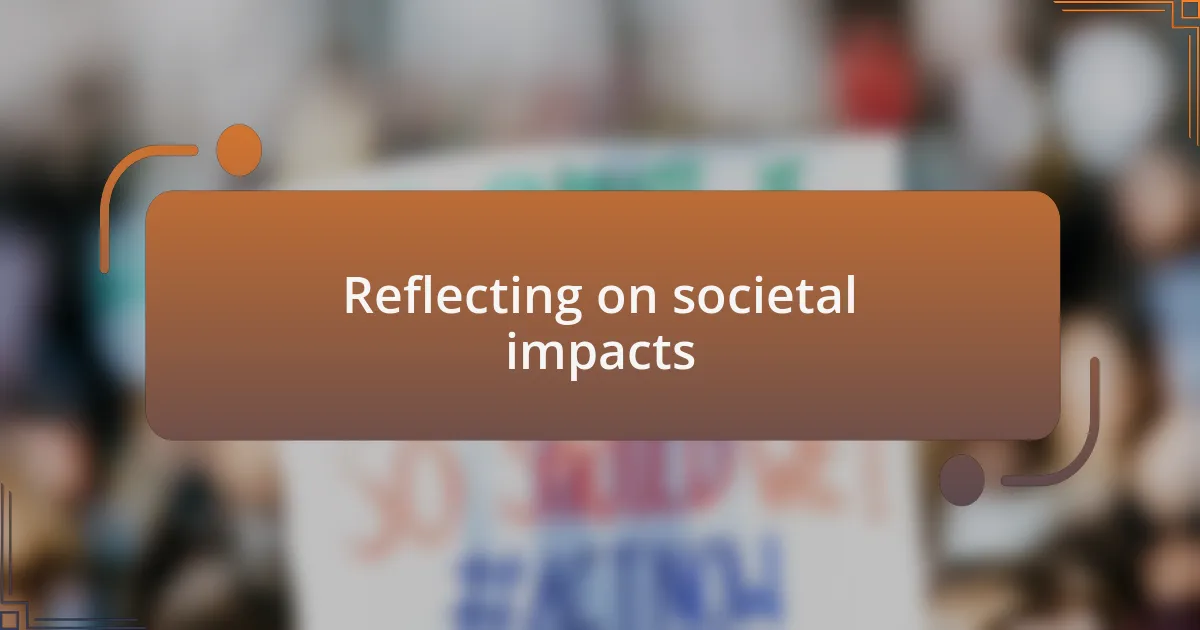
Reflecting on societal impacts
Reflecting on societal impacts has opened my eyes to the disparities in educational access across different communities. I often think back to a workshop I attended, where I met students from underfunded schools; their eagerness to learn was palpable, yet I could see the weight of their challenges. How could I take my experiences and resources and channel them into empowering others who are equally passionate but face significant obstacles?
Looking around at the spaces where education flourishes versus those that struggle highlights just how intertwined our societal structures are with access to learning. I remember an encounter with a fellow advocate who shared her journey through a public school system riddled with challenges. This juxtaposition made me realize how critical it is to understand and address these societal gaps to pave the way for a more equitable future for everyone, particularly in important conversations like those surrounding pro-life advocacy.
As I reflect on these societal impacts, I often ask myself how I can contribute to the change I wish to see. Each time I engage in discussions about pro-life advocacy, I feel the weight of responsibility pressing on my shoulders. It isn’t just about sharing my views; it’s about ensuring that the voices of those who struggle are included in the dialogue. What steps am I willing to take to uplift them? These reflections challenge me to act with intention, recognizing that my educational privileges can play a crucial role in shaping a more inclusive conversation.
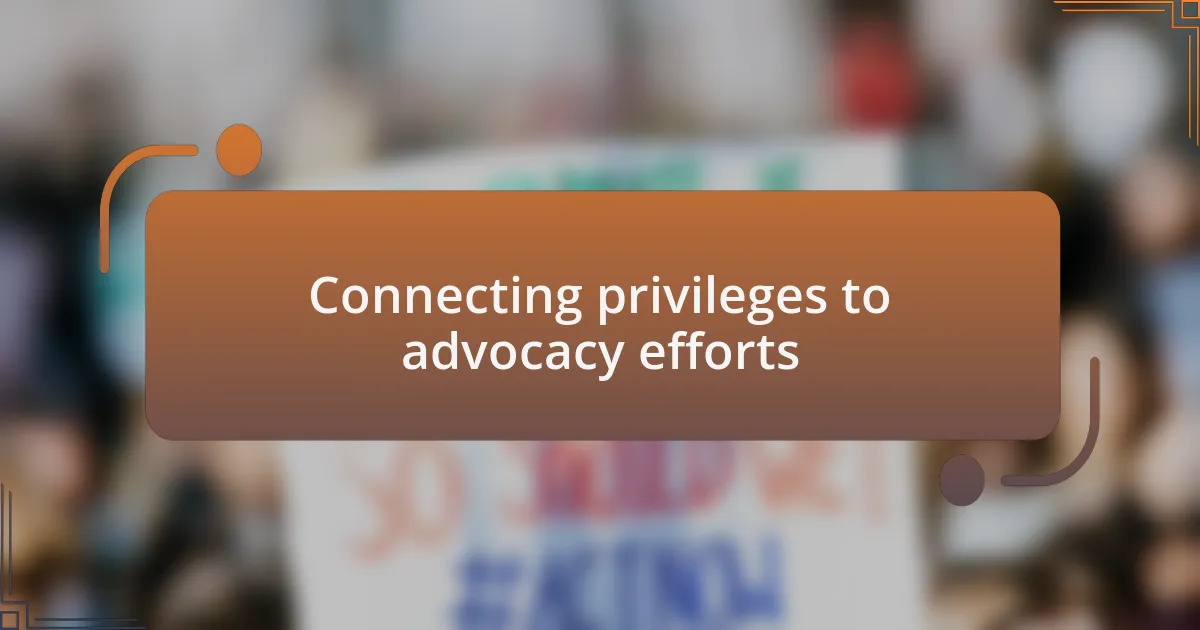
Connecting privileges to advocacy efforts
Connecting privileges to advocacy efforts is a profound journey that has shaped my understanding of the responsibilities that come with my educational background. I often recall a community service project I was involved in, where I mentored high school students. They were hungry for new ideas, yet I could sense the barriers they faced—the lack of resources and guidance that many take for granted. How can I use my knowledge and experiences to bridge that gap, to ensure their voices are amplified in spaces where they matter?
The advocacy landscape is vast, and reflecting on my privileges has made me acutely aware of how I can influence it more effectively. I remember attending a pro-life conference where I was surrounded by passionate individuals, yet I realized that many were unaware of the unique hurdles faced by marginalized groups. How can we advocate for life if we are not inclusive and proactive about understanding the diverse narratives that shape our community? This question persists in my mind, urging me to dig deeper and become an ally for those often overlooked.
By connecting my educational privileges to my advocacy efforts, I feel a strong moral imperative to act. I once had an enlightening conversation with a young mother who struggled to navigate the system while trying to provide for her child. Listening to her story reinforced my belief that advocating for pro-life issues must extend beyond theoretical discussions. It’s essential to recognize the lived experiences of those we aim to support and to engage with empathy and understanding. In what ways can I integrate these realities into my advocacy work? This clarity compels me to take concrete actions that align with my commitment to uplifting every story, especially those from underrepresented voices.
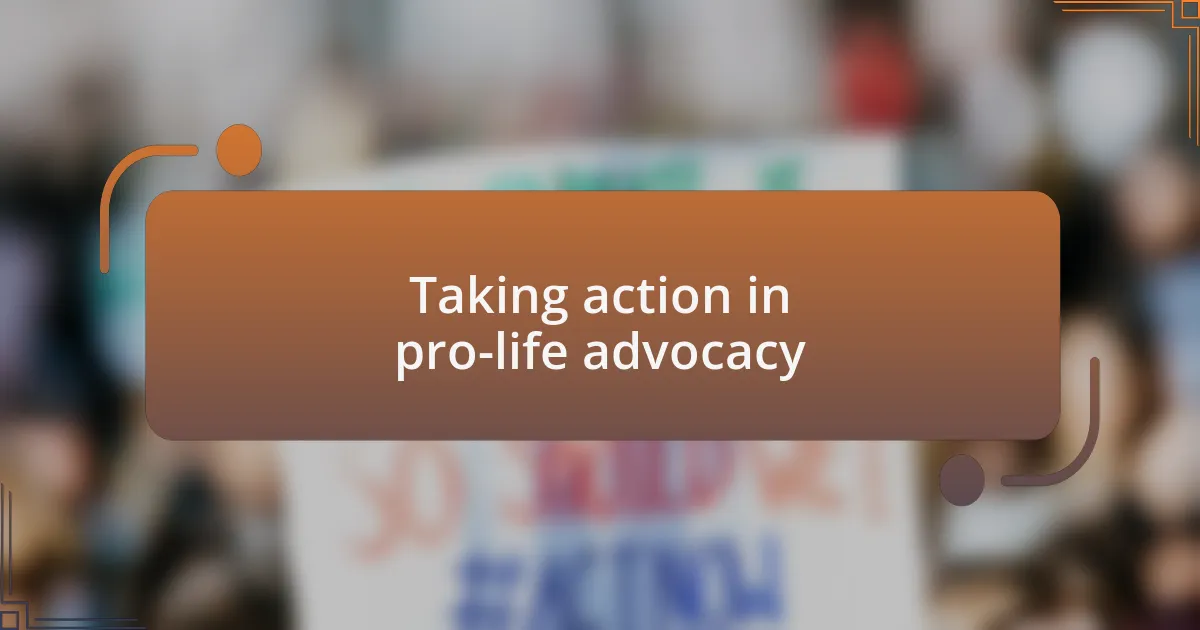
Taking action in pro-life advocacy
Taking action in pro-life advocacy requires more than just passion; it demands a commitment to specific, measurable actions. I remember volunteering at a local crisis pregnancy center. I was struck by the strength of the women I met, many of whom needed not just support, but practical resources to help them make informed choices. How could I help create systems that empower them to succeed?
Engaging with my community has opened my eyes to the importance of collaboration in advocacy. During a recent outreach event, I partnered with youth organizations to facilitate workshops that focused on sexual health education. It was rewarding to see young people take an active interest in their futures, but it also revealed a greater challenge. How can we ensure that every voice, especially the most vulnerable, is included in this conversation? This question drives me to seek broader partnerships that enhance our collective impact.
Ultimately, making a difference in pro-life advocacy is about personal stories and shared experiences. I often reflect on a heartfelt discussion I had with a friend who faced an unplanned pregnancy. Her journey illuminated the complexities surrounding the choice of life and the myriad of emotions involved. It reinforced my belief that advocacy must be rooted in empathy. How can we be effective advocates if we don’t fully understand the struggles of those we aim to support? This insight fuels my determination to listen actively and advocate for change that resonates with real-life experiences.
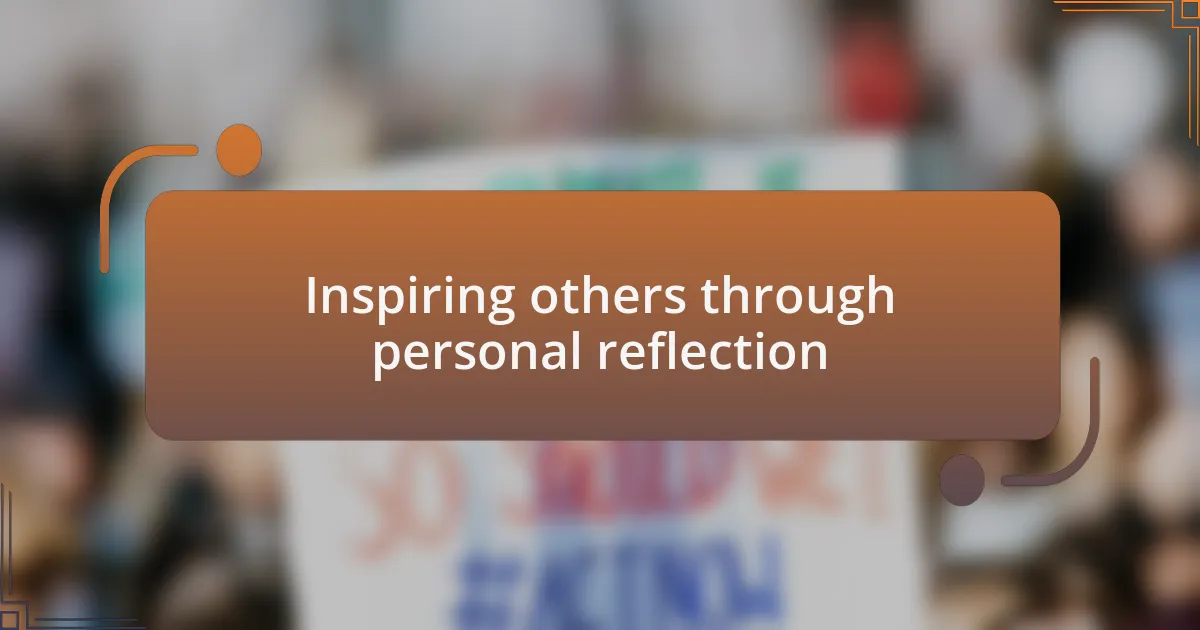
Inspiring others through personal reflection
Reflecting on my own educational privileges has been a profound journey. I recall sitting in classrooms where discussions on reproductive health were not just welcomed but encouraged. This experience has motivated me to share my story, hoping others will see the value in their own reflections. How can our educational backgrounds shape our perspectives on advocacy and empathy?
One moment that stands out to me is when I facilitated a discussion with peers who had different experiences. Hearing their stories of navigating life’s challenges made me realize the weight of my own privilege. I felt moved to inspire others to reflect on their journeys, too. What if everyone took a moment to analyze how their educational paths inform their views on life and choice? This could be a powerful catalyst for change within our community.
Furthermore, I often think about the voices that remain unheard. By sharing my educational experiences and the insights gained, I encourage others to do the same. I believe that personal reflections can bridge gaps in understanding and foster connections. Could it be that our shared narratives empower those who feel isolated in their struggles? This idea fuels my passion for inspiring conversations around personal growth and collective responsibility in advocacy.